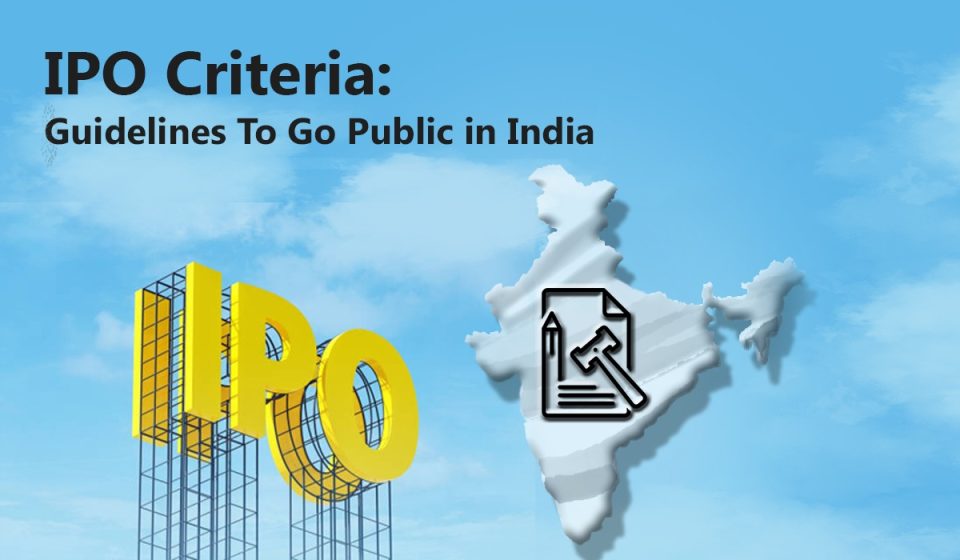What are the eligibility criteria for an Indian Company to go Public?
Companies looking to go public in India must follow regulations enforced by SEBI to ensure a secure, transparent trading process and justified capital raise from investors. Here are the requirements companies must meet under SEBI guidelines to go public.
Companies can go public in two of the following ways, the companies that are yet to be listed, go for the Initial Public Offer (IPO), which is a public issue, i.e. they raise funds from the general public for the first time, is covered under SEBI IPO guidelines. On the other hand, companies that are already listed on the stock exchange/s may go for a Follow-up Public Offer (FPO), i.e. going public for the second time or more than the second time.
What are the criteria for a company to go public for the first time?
The company applying for an Initial Public Offer (IPO) in India must meet the following criteria, for doing the procedure for IPO in India. SEBI guidelines for listing of shares are as follows:
1. The company should have been in operation for at least 3 years and must remain a registered business for a minimum of 3 years.
2. The company’s net worth on a consolidated basis for each of the past 3 years should be at least Rs 1 crore.
3. The net tangible asset value of the company should be approximately Rs 3 crore for each of the past 3 full years, and not more than 50% should be in cash or cash equivalent.
4. The company should not have defaulted on any loans or other credit lines.
5. The total issue size of the IPO should not exceed 5 times the company’s net worth.
6. If the company has incorporated a new name, 50% of its total revenue earned in the last year should be generated after the incorporation of the new name.
7. The company should have an average operating profit of at least Rs 15 crore calculated on a consolidated basis annually for the previous 3 years.
Are there any other requirements for a company to meet before it can offer its shares to the public?
SEBI IPO guidelines have set requirements for companies looking to make a public issue or offer. These requirements are known as entry norms and are meant to protect investors by ensuring that companies meet certain financial criteria.
For unlisted companies:
Making an initial public offering (IPO), there are two routes to comply with the entry norms.
The first route, known as the “Profitability Route,” includes requirements such as having a certain level of net tangible assets, pre-tax operating profit, and net worth.
The second route, known as the “QIB Route,” allows companies that do not meet the Profitability Route conditions to access the primary market through the book-building route, with at least 75% of the offer to be allotted to Qualified Institutional Buyers (QIBs).
Listed companies:
Making a follow-on public offering (FPO) must also meet specific requirements if they have changed their name within the last year or if the proposed issue size exceeds five times the pre-issue net worth. If these conditions are not met, the company can still make an FPO by complying with the QIB Route specified for IPOs.
Additionally, there are no entry norms for a listed company making a rights issue.
The requirements and provisions set by SEBI are aimed at ensuring transparency and protecting the interests of investors in the capital market.
What do you mean by Promoter’s Contribution and Lock-In and IPO Grading?
Before a company makes a public offering, there are certain requirements they need to meet. Here are two of the main ones:
1. Promoter’s Contribution and Lock-In:
When an unlisted company makes a public offering, the promoters must put in at least 20% of the shares after the offering, and these shares cannot be sold for 3 years. The promoters also need to keep the rest of their shares for at least 1 year after the company goes public. If a listed company is making the offering, the promoters must contribute at least 20% of the shares or 20% of the offering size. If the promoters have used the contributed funds, they need to include a cash flow statement in the offering document.
2. IPO Grading:
An IPO grade is given by a Credit Rating Agency registered with SEBI and provides an evaluation of the IPO’s fundamentals in comparison to other listed equity securities. Companies issuing an IPO must disclose the IPO grade they receive.
What are the eligibility criteria for profitable and non-profitable companies to go for an IPO?
For a profitable company
To qualify, SEBI has laid down IPO guidelines a profitable company must meet the following criteria:
1. The company must have a net worth of at least Rs. 1 crore in each of the previous three years.
2. The company’s net tangible assets must be worth at least Rs. 3 crores in each of the last three years, with not more than 50% (Rs. 1.5 crores) as cash or cash equivalents, unless the IPO is through an Offer for Sale (OFS).
3. If the company has changed its official name, it must have earned 50% of the total revenue in the last year from business operations after attaining its new name.
4. The company must have an average pre-tax operating profit of at least Rs. 15 crores in at least three of the last five years.
5. The value of the IPO issue size must not exceed five times the company’s total net worth before launching the issue.
For a non-profitable company
If a company is not making a profit, it has to use the Qualified Institutional Buyers (QIB) route to launch an IPO. The IPO must be done using the book-building method.
The company has to give at least 75% of the total issue size to QIBs. If the company doesn’t allocate this minimum amount to QIBs, it must refund the total IPO subscription amount.
What is the QIB Route for an IPO?
To proceed with an Initial Public Offering (IPO) in India, companies have the option to utilize the Qualified Institutional Buyers (QIB) route, especially if they are unable to meet stringent profitability requirements. The QIBs, or Qualified Institutional Buyers, represent major financial entities including public financial institutions, mutual funds, and foreign portfolio investors. These institutions possess extensive expertise in the equity market and have the capacity to make substantial investments in a company.
Companies looking to tap into the QIB route must adhere to specific criteria:
1. Implement the book-building IPO method.
2. Allocate at least 75% of the net offering to QIBs.
3. If the minimum allotment requirement is not met, refund the total IPO subscription amount.
QIBs make substantial investments in IPOs, and once they have placed their bids, they are unable to retract them. Consequently, QIBs typically make their investments on the final day of the subscription period. Before applying, these institutional investors must register with the Securities and Exchange Board of India (SEBI).
Frequently Asked Questions (FAQs)
1) Who are QIBs as per SEBI guidelines?
As per the Securities and Exchange Board of India (SEBI), Qualified Institutional Buyers (QIBs) are institutional investors possessing the knowledge and resources to participate in capital markets.
QIBs are groups of individual investors who combine significant sums of money and utilize financial services from a third party to make investments.
2) Provide the list of any 4 QIBs as per SEBI in India.
- SEBI regulates mutual funds, alternative investment funds, venture capital funds, and foreign venture capital investors.
- Commercial banks are regulated by SEBI.
- SEBI also regulates public financial institutions.
- Investors from foreign countries must be registered with SEBI.
3) Which section of the SEBI rules laid the guidelines for QIBs in India?
QIBs are specifically defined under Regulation 2(1) (ss) of the SEBI (Issue of Capital and Disclosure Requirements) Regulations, 2018.
They are acknowledged as legal entities by exchange boards and require less supervision from central authorities.
4) What is a Follow-up Public Offer (FPO)?
When a listed company issues new shares to existing investors, it’s called a follow-on public offer (FPO). This happens after the initial public offering (IPO) and is also known as a secondary offering.
To get a full list of the upcoming, current, and closed IPOs, check our Unicorn Signals App – IPO Scanners tool, and fetch the latest updates.
Disclaimer: Investing in the Equity market in India is subject to risks, i.e. the market keeps on fluctuating. This article is purely for educational purposes. The views expressed and data provided here are by Equitypandit’s team. Kindly do not completely depend on the information provided as the risk appetite differs from individual to individual and there are various other factors in the market to determine the factors to invest in the market.







